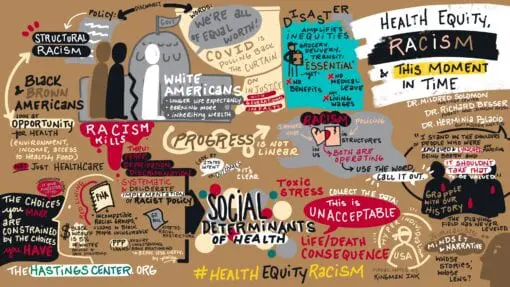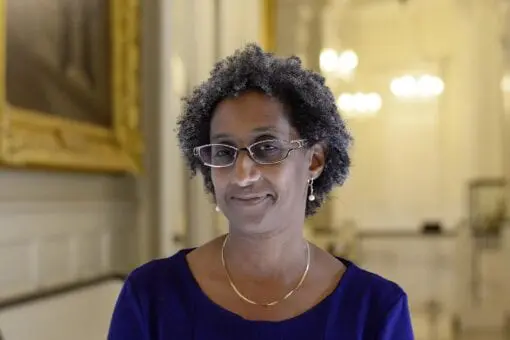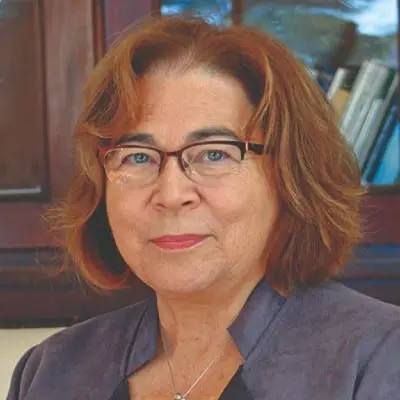Health Equity, Racism, and This Moment in Time
an online event series

Disparate health outcomes for people of color and the poor have been recognized for decades, but the pandemic has made them inescapably visible. Visible too is the racism that accounts for the cruelty witnessed as millions watched George Floyd’s murder. We know the social causes of these inequities and the policies that could address them. Yet as a nation we have failed to act. Now, we face three simultaneous crises—in public health, in the economy, and in the American relationship to race. Can we seize the moment and advance health and well-being for all of us? What’s at stake if we don’t? What are the best ways to proceed?
Download and read the Health Equity, Racism transcript.
Watch the video:
Thursday, August 13, 2020, 11:00 AM – 12:00 PM
A Hastings Conversations event with:
Richard Besser, President, The Robert Wood Johnson Foundation
Herminia Palacio, President, The Guttmacher Institute
Mildred Z. Solomon, President, The Hastings Center
This webinar was the first in a new series of Hastings Conversations called “Securing Health in a Troubled Time: Equity, Ethics, and the Common Good.” The series will examine the social causes of health inequities and identify policies and practices to achieve healthier lives for all of us. Read more about the series here.
More about the panelists:
 Richard Besser, MD, is president and CEO of The Robert Wood Johnson Foundation (RWJF). Formerly, he was acting director for the Centers for Disease Control and Prevention (CDC), and ABC News’ chief health and medical editor. At RWJF, Dr. Besser leads the largest private foundation in the country devoted solely to improving the nation’s health. Under his leadership, the foundation has dedicated itself to promoting health equity and building a comprehensive Culture of Health that can provide everyone in America with a fair and just opportunity to live the healthiest life possible. Priorities include access to healthy food, clean air and water, safe housing, secure employment at a living wage, transportation, education, and the elimination of barriers from discrimination.
Richard Besser, MD, is president and CEO of The Robert Wood Johnson Foundation (RWJF). Formerly, he was acting director for the Centers for Disease Control and Prevention (CDC), and ABC News’ chief health and medical editor. At RWJF, Dr. Besser leads the largest private foundation in the country devoted solely to improving the nation’s health. Under his leadership, the foundation has dedicated itself to promoting health equity and building a comprehensive Culture of Health that can provide everyone in America with a fair and just opportunity to live the healthiest life possible. Priorities include access to healthy food, clean air and water, safe housing, secure employment at a living wage, transportation, education, and the elimination of barriers from discrimination.
 Herminia Palacio, MD, MPH is president and CEO of the Guttmacher Institute whose mission is to advance sexual and reproductive health and rights in the United States and globally. Formerly, she served as Deputy Mayor for Health and Human Services for the City of New York. In this role, Dr. Palacio was in charge of transformation efforts across the city’s public health and health care system, expanding access to social services and ensuring that agencies serving the city’s most vulnerable populations are run compassionately, equitably, and effectively. Dr. Palacio is also a crisis management expert. During Hurricane Katrina, she designed and oversaw public health and health care for 27,000 evacuees to Texas from the New Orleans area. In 2007, the American Public Health Association honored her for this work with their Excellence in Health Administration Award.
Herminia Palacio, MD, MPH is president and CEO of the Guttmacher Institute whose mission is to advance sexual and reproductive health and rights in the United States and globally. Formerly, she served as Deputy Mayor for Health and Human Services for the City of New York. In this role, Dr. Palacio was in charge of transformation efforts across the city’s public health and health care system, expanding access to social services and ensuring that agencies serving the city’s most vulnerable populations are run compassionately, equitably, and effectively. Dr. Palacio is also a crisis management expert. During Hurricane Katrina, she designed and oversaw public health and health care for 27,000 evacuees to Texas from the New Orleans area. In 2007, the American Public Health Association honored her for this work with their Excellence in Health Administration Award.
 Mildred Z. Solomon, EdD is president and CEO of The Hastings Center, the nation’s founding bioethics research institute. Both a bioethicist and a social scientist, Dr. Solomon does normative and empirical research on values questions and moral uncertainty in health, health care, and science policy. Her research has focused on ethical issues in end-of-life care, organ transplantation, medical professionalism, and protection of human research participants. She is also Professor of Global Health and Social Medicine at Harvard Medical School, where she directs the school’s Fellowship in Bioethics and has mentored more than 200 physicians and other health care professionals working in the Harvard-affiliated hospitals. Formerly, Dr. Solomon was Senior Director for Implementation Science at The Association of American Medical Colleges, where she promoted evidence-based practices in hospitals and health systems.
Mildred Z. Solomon, EdD is president and CEO of The Hastings Center, the nation’s founding bioethics research institute. Both a bioethicist and a social scientist, Dr. Solomon does normative and empirical research on values questions and moral uncertainty in health, health care, and science policy. Her research has focused on ethical issues in end-of-life care, organ transplantation, medical professionalism, and protection of human research participants. She is also Professor of Global Health and Social Medicine at Harvard Medical School, where she directs the school’s Fellowship in Bioethics and has mentored more than 200 physicians and other health care professionals working in the Harvard-affiliated hospitals. Formerly, Dr. Solomon was Senior Director for Implementation Science at The Association of American Medical Colleges, where she promoted evidence-based practices in hospitals and health systems.

